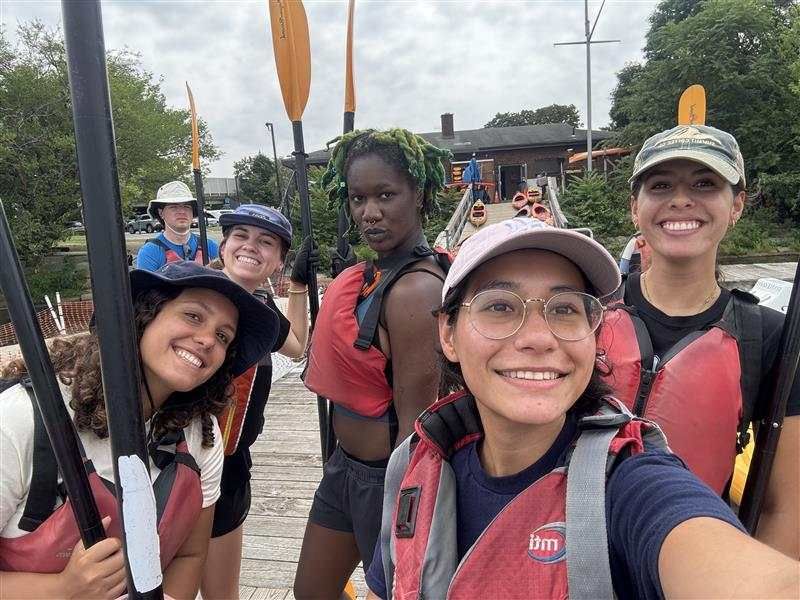By Scarlett Gonzalez, Climate Education Fellow

During a fellows’ field trip with the Mystic River Watershed Association, I stared into a vial of river water as the color shifted from clear to purple to clear again, before sheepishly asking, “So…what does this actually tell us?”
The educator kindly explained that we were measuring the amount of dissolved oxygen in the water, and our sample indicated that the river had plenty for the fish and plant life to thrive that day.
I felt a little embarrassed that I didn’t understand the Winkler Titration Method as well as my peers; my past work in environmental policy has often left me one of the most knowledgeable people in a room, and it’s been challenging, in my role as Mass Audubon’s Climate Education Fellow, to find myself in a climate-oriented environment and not know all the answers.
But asking the “obvious” question is not a weakness. My job, I’ve learned, is less about having all the answers and more about modeling curiosity for the youth leaders that I support.
Much of my time as the Climate Education Fellow is spent supporting Mass Audubon’s Youth Climate Leaders Program (YCLP), a program that empowers youth activists to lead and drive climate action across the state. Since starting in June, I’ve worked to strengthen the program’s structure—meeting with youth leaders, coordinating with coalition partners, and identifying gaps in onboarding and mentorship. I am also currently supporting the YCLP’s annual retreat, where youth leaders gather to share ideas, ask questions, and connect with one another. At this retreat, I’ll be leading a workshop on climate policy and advocacy, where interested youth leaders can begin exploring climate questions of their own.
Recently, alongside the Massachusetts Youth Climate Coalition, YCLP leaders spearheaded H.560/S.391: An Act Implementing Elementary and Secondary Interdisciplinary Climate Literacy Education. I’m excited to help prepare them for an upcoming hearing and lobby day at the State House, drawing on my policy background to ensure their voices land powerfully. (Download this fact sheet to read more about the bill.)
Outside of my day-to-day tasks within the Education Department, I’m challenging myself to interact with nature in ways that are new for me. Before this fellowship, nature was something I appreciated from afar; I have never been the type to dig in the dirt, poke around tidepools, or pick up periwinkles—now, that’s changing. As I help guide the questions that youth climate leaders are asking, I’m finding new questions myself.
And while I may not always know the answers, I’m learning that the lesson is in the asking.
Scarlett Gonzalez (she/her) is from rural Indiana, where her interest in environmental justice began through learning how the animal agriculture industry and labor rights intersect with environmentalism. In 2023, she earned a Bachelor of Arts in Public Policy and Environmental Studies from New York University.
In college, Scarlett successfully encouraged her university to fully divest from fossil fuels as a member of the Sunrise Movement NYU chapter. She then worked with Rep. Raúl Grijalva and the House Natural Resources Committee as a Congressional Hispanic Caucus Institute Public Policy Fellow.
In her free time, Scarlett enjoys kayaking, journaling, and visiting new coffee shops.

